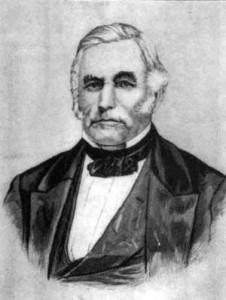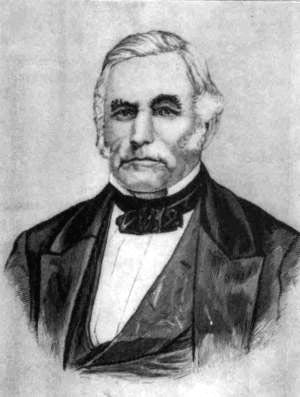By Terrie
Lilburn W. Boggs was born in 1796 in Lexington, Kentucky. He held a variety of occupations, including bookkeeper, bank cashier, merchant, Indian agent and trader, lawyer, doctor, postmaster, and politician. It was his role as a politician that eventually placed him negatively in Mormon history (The Church of Jesus Christ of Latter-day Saints).
 As Lieutenant Governor, Boggs handled a tense situation poorly, acting on inaccurate information and against the U.S. Constitution. He ordered the militia to pursue the Mormons. The Mormons received promises of safety from the militia in return for their guns and other weapons. They were also required to hand over Joseph Smith and other Church leaders. The Latter-day Saints were assured their enemies were being required to do the same. However, they had been lied to, and their weapons were actually given to their enemies. Now with no way to protect themselves, and their own weapons in the hands of their enemies, they were in extreme danger. The men who had received the guns returned with them the next day, beating the Latter-day Saint men and setting their houses on fire as the women and children fled for their lives.
As Lieutenant Governor, Boggs handled a tense situation poorly, acting on inaccurate information and against the U.S. Constitution. He ordered the militia to pursue the Mormons. The Mormons received promises of safety from the militia in return for their guns and other weapons. They were also required to hand over Joseph Smith and other Church leaders. The Latter-day Saints were assured their enemies were being required to do the same. However, they had been lied to, and their weapons were actually given to their enemies. Now with no way to protect themselves, and their own weapons in the hands of their enemies, they were in extreme danger. The men who had received the guns returned with them the next day, beating the Latter-day Saint men and setting their houses on fire as the women and children fled for their lives.
Despite this, Generals Atchison and Doniphan managed to get things under control and wrote to Governor Boggs:
“Things are not so bad in that county [Daviess] as represented by rumor, and, in fact, from affidavits I have no doubt your Excellency has been deceived by the exaggerated statements of designing or half crazy men. I have found there is no cause of alarm on account of the Mormons; they are not to be feared; they are very much alarmed.” General Doniphan even ordered a militia formed to protect the Mormons from the lawless mobs. General Parks told the Mormons, “I have visited your place frequently, [and] find you to be an industrious and thriving people, willing to abide the laws of the land; and I deeply regret that you could not live in peace and enjoy the privileges of freedom.”
Boggs became the governor after the previous governor resigned. He was now in an even better position to pursue his course of religious persecution. At that time, the fourteenth amendment had not yet been passed and the federal government, even if it had been inclined to do so, could not force states to obey the Constitution, so Boggs had free reign. He had been consistently urged by a non-Mormon general to visit the Mormon communities for himself, so he could see they were good people merely terrified for their lives, but Boggs refused. He had, prior to becoming the governor, assisted in expelling the Mormons from Jackson County and some historians believe he helped to spread rumors that led to increased persecution, although there is no firm evidence of that.
Rumors circulated that the Mormons had taken possessions and homes belonging to the residents of Daviess County. The governor was given evidence by military leaders that this was false, but ignored that evidence. He used the rumors to insist that the Mormons pay for the losses that had never occurred. When he learned the Mormons refused and were prepared to stand up for their Constitutional rights, he issued the now infamous extermination order. This order stated that Mormons were to be driven from the state, and if they resisted expulsion, they were to be “exterminated.” This unprecedented event in American history led to intense suffering among the Mormons. General Atchison was replaced by another general, and thus was unable to assist. General Doniphan soon thereafter refused to carry out an order to kill Joseph Smith by firing squad, calling it cold-blooded murder.
In 1976, the extermination order was discovered to still be in effect. The current governor quickly cancelled it with apologies to the church. “Expressing on behalf of all Missourians our deep regret for the injustice and undue suffering which was caused by this 1838 order, I hereby rescind Executive Order No. 44 dated October 27, 1838, issued by Governor Lilburn W. Boggs.”
The order left those who opposed the church free to do anything at all without penalty. People were killed, including children, by mob violence. Hundreds of Saints were driven from their homes. Eventually, Joseph Smith and his brother Hyrum were also murdered, though not in Missouri.
Four years later, Governor Boggs was shot. Although the Mormons were now gone, he personally believed they had tried to kill him. He eventually decided to travel west to try to stir up trouble in a desire for revenge. His efforts failed. He lived in several states and also in Mexico after his political career ended. He died in California in 1861.
Sources:
The Joseph Smith Papers, Lilburn W. Boggs
Every Person in the Doctrine and Covenants, Lynn F. Price, published by Cedar Fort, 2007
Church History in the Fullness of Times
About Keith L. Brown
Keith L. Brown is a convert to The Church of Jesus Christ of Latter-day Saints, having been born and raised Baptist. He was studying to be a Baptist minister at the time of his conversion to the LDS faith. He was baptized on 10 March 1998 in Reykjavik, Iceland while serving on active duty in the United States Navy in Keflavic, Iceland. He currently serves as the First Assistant to the High Priest Group for the Annapolis, Maryland Ward. He is a 30-year honorably retired United States Navy Veteran.


 Watch a video about the restoration of the gospel on lds.org
Watch a video about the restoration of the gospel on lds.org
Excellent recounting of the history, Sir. I can’t seem to figure out why Gov. Boggs is not held up more as the perfect example of tyranny and religious persecution and an example of history that should not be repeated. Every politician fighting for religious freedom should be teaching their constituents what happens when too much power and authority is vested in the Executive Branch of government.
Likewise, as a Navy Veteran yourself would likely agree, General Doniphan should be hearlded as the type of soldier and leader we need in our military today. His willingness to be insubordinate to an unconstitutional and wicked command against the very citizens he was charged to protect is a true “Profile in Courage”. I pray our armed forces today learn this vital lesson before the day comes when they are asked by a charismatic tyrant under the veil of “Crisis” to turn the weapons we have paid for on “We the People”.